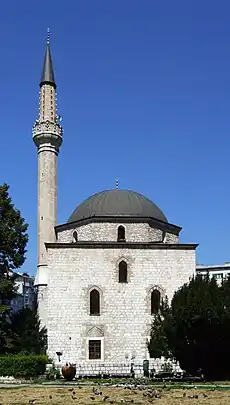| Ali Pasha Mosque Alipašina džamija | |
|---|---|
 | |
| Religion | |
| Affiliation | Sunni Islam |
| Location | |
| Location | Sarajevo, Bosnia and Herzegovina |
| Geographic coordinates | 43°51′28.5″N 18°24′45.5″E / 43.857917°N 18.412639°E |
| Architecture | |
| Type | Mosque |
| Style | Ottoman architecture |
| Funded by | Sofu Hadım Ali Pasha |
| Completed | 1561 |
| Specifications | |
| Dome(s) | 1 |
| Minaret(s) | 1 |
Ali Pasha Mosque (Turkish: Ali Paşa Camii; Bosnian: Ali-pašina džamija) was constructed in Sarajevo, Bosnia and Herzegovina during 1560–61 as a vakıf—the legacy or perpetual endowment—of Sofu Hadım Ali Pasha, an Ottoman statesman who served as the governor of the Bosnia Eyalet of the Ottoman Empire amongst other roles, after his death in September 1560.
Description
The mosque was built according to the classical Ottoman architectural style. A dome covers the prayer area and three smaller domes cover the cloister. Its proportions make it the largest sub-dome mosque in Bosnia and Herzegovina. The grounds of the complex contain a mausoleum (türbe) with two sarcophagi—those of Avdo Sumbul and Behdžet Mutevelić, Gajret activists who died in the dungeons of Arad. The Ali Pasha Mosque was heavily damaged by Serbian forces during the Bosnian War of the early 1990s, especially the dome.[1] The most recent renovation of the mosque occurred in 2004 and in January 2005, the Commission to Preserve National Monuments issued a decision to add the Ali Pasha Mosque to the list of National Monuments of Bosnia and Herzegovina.[2]
See also
References


